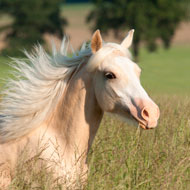
Research uncovers 'surprising' number of facial movements
Horses have a 'surprising' repertoire of facial expressions - many of which they share with humans - according to new research.
Findings published in the journal PLOS ONE suggest that, like humans, horses alter their facial expressions in different social situations using muscles in the nostrils, lips and eyes, for example.
The study's co-lead author, Jennifer Wathan, is a doctoral researcher at the University of Sussex. She said that while horses are largely visual animals, with better eyesight than domestic dogs and cats, their facial expressions have been "largely overlooked".
Commenting on the team's findings, she added: "What surprised us was the rich repertoire of complex facial movements in horses, and how many of them are similar to humans.
“Despite the differences in face structure between horses and humans, we were able to identify some similar expressions in relation to movements of the lips and eyes."
Previously, scientists believed that the further away a species was from humans in evolutionary terms, the more basic its facial expressions would be.
However, co-lead author Professor Karen McComb says that following their latest research, "it’s apparent that horses, with their complex and fluid social systems, also have an extensive range of facial movements and share many of these with humans and other animals."
Researchers from the University of Sussex collaborated with those from the University of Portsmouth and Duquesne University to develop a coding system to identify different facial expressions.
The Equine Facial Action Coding System (EquiFACS) consists of 17 discrete facial movements (or 'action units') in horses. This compares to 27 in humans, 16 in dogs and 13 in chimps.
In order to identify different facial movements, the research team studied video footage of a wide range of naturally occurring behaviours in horses. Furthermore, they carried out an anatomical investigation of the facial muscles responsible for each movement.
Each facial expression identified has been given a code. The system allows researchers to document the facial movements associated with different social and emotional situations.
It is hoped this will offer insights into the social world experienced by horses. Prof McComb says it will also provide important information for veterinary and animal welfare organisations. Researchers will now look at how these expressions relate to emotional states.



 The latest
The latest